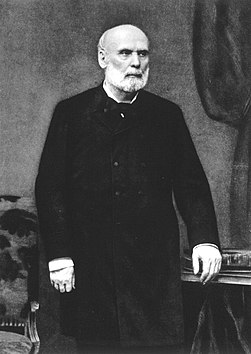
Jules François Simon was a French statesman and philosopher, and one of the leaders of the Moderate Republicans in the Third French Republic.

Eugène Henri Brisson was a French statesman, Prime Minister of France for a period in 1885-1886 and again in 1898.
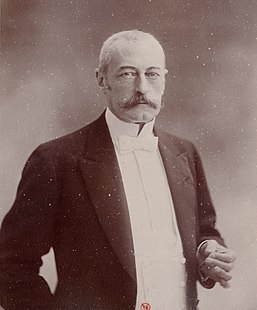
Pierre Marie René Ernest Waldeck-Rousseau was a French Republican politician, who served 29th Prime Minister of France.

René Goblet was a French politician, Prime Minister of France for a period in 1886–1887.

Maurice Rouvier was a French statesman of the "Opportunist" faction, who served as the Prime Minister of France. He is best known for his financial policies and his unpopular policies designed to avoid a rupture with Germany.

Louis Joseph Ernest Picard was a French politician.
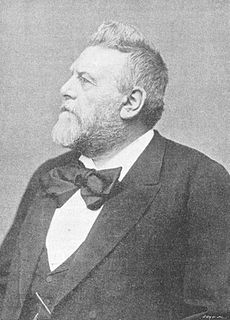
Eugène Spuller was a French politician and writer.

Jules Vallès was a French journalist and author.
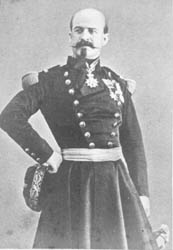
The Government of National Defense was the first government of the Third Republic of France from 4 September 1870 to 13 February 1871 during the Franco-Prussian War. It was formed after the Emperor Napoleon III was captured by the Prussian Army. The government, headed by General Louis Jules Trochu, was under Prussian siege in Paris. Breakouts were attempted twice, but met with disaster and rising dissatisfaction of the public. In late January the government, having further enraged the population of Paris by crushing a revolutionary uprising, surrendered to the Prussians. Two weeks later, it was replaced by the new government of Adolphe Thiers, which soon passed a variety of financial laws in an attempt to pay reparations and thus oblige the Prussians to leave France, leading to the outbreak of revolutions in French cities, and the ultimate creation of the Paris Commune.
The 16 May 1877 crisis was a constitutional crisis in the French Third Republic concerning the distribution of power between the President and the legislature. When the royalist President Patrice MacMahon dismissed the Opportunist Republican Prime Minister Jules Simon, the parliament on 16 May 1877 refused to support the new government and was dissolved by the President. New elections resulted in the royalists increasing their seat totals, but nonetheless resulted in a majority for the Republicans. Thus, the interpretation of the 1875 Constitution as a parliamentary system prevailed over a presidential system. The crisis ultimately sealed the defeat of the royalist movement, and was instrumental in creating the conditions of the longevity of the Third Republic.
The Moderates or Moderate Republicans, pejoratively labeled Opportunist Republicans, were a French political group active in the late 19th century during the Third French Republic. The leaders of the group included Jules Ferry, Jules Grévy, Henri Wallon and René Waldeck-Rousseau.
The Republican Union, later known as the Progressive Union, was a French parliamentary group founded in 1871 as a heterogeneous alliance of moderate radicals, former Communards and opponents of the French-Prussian Treaty.

The Léon Gambetta-class cruisers were a group of three armored cruisers built for the French Navy during the first decade of the 20th century.

Charles Louis de Saulces de Freycinet was a French statesman and four times Prime Minister during the Third Republic. He also served an important term as Minister of War (1888–93). He belonged to the Opportunist Republicans faction.

Eugène Etienne was a French politician who was a Deputy from 1881 to 1919, Minister of War in 1913, and a Senator from 1920 until his death.

Jules-Théodore-Joseph Cazot was a French politician of the French Third Republic. He was a member of the National Assembly of 1871. He was a senator for life from 1875 until his death. He was minister of justice in 1880 and 1881, under the governments of Jules Ferry and Léon Gambetta.
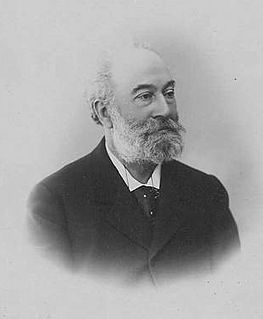
David Raynal was a French politician of the French Third Republic. He was a member of the Chamber of Deputies of France (1879–1897) and Senate of France (1897–1903). He was twice minister of public works in the governments of Léon Gambetta and Jules Ferry. He was minister of the interior in the government of Jean Casimir-Perier.

Louis Tirman was a French lawyer and civil servant who was prefect of several departments, Governor General of French Algeria from 1881 to 1891 and then Senator of Ardennes from 1892 until his death in 1899. He believed in consolidating the French presence in Algeria through support of the colons, and the grant of French nationality to the Algerian-born children of Spanish and Italian settlers.

